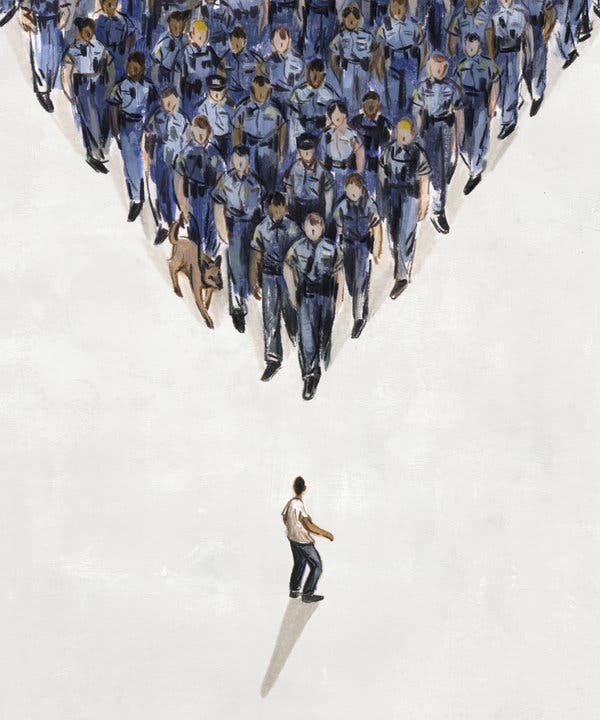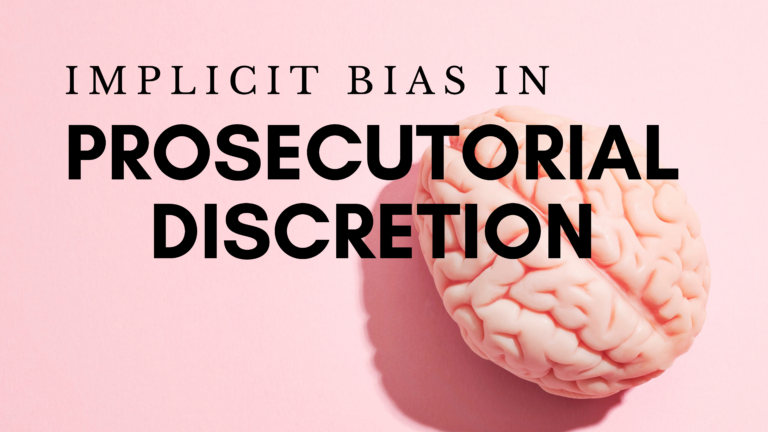All content categorized with: Criminal Legal System
Filter
Post List
Carceral Socialization as Voter Suppression
In an era of mass incarceration, many people are socialized through interactions with the carceral state. These interactions are powerful learning experiences, and by design, they are contrary to democratic citizenship. Citizenship is about belonging to a community of equals, being entitled to mutual respect and concern. Criminal punishment deliberately harms, subordinates, and stigmatizes. Encounters with the carceral system are powerful experiences of anti-democratic socialization, and they impact peoples’ sense of citizenship and trust in government. Accordingly, a large body of social science research shows that eligible voters who have carceral contact are significantly less likely to vote or to participate in politics. Hence, the carceral system’s impact on political participation goes well beyond those who are formally disenfranchised due to convictions. It also suppresses participation among the millions of legally eligible voters who have not been formally disenfranchised—people who have had more fleeting encounters with law enforcement or vicarious interactions with the carceral system. This Article considers the implications of these findings from the perspective of voting rights law and the constitutional values underlying it. In a moment when voting rights are under siege, voting rights advocates are in a heated discussion about how our federal and state constitutions protect ideals of democratic citizenship and political equality. This discussion has largely (and for good reason) focused on how the law should address what I call “de jure” suppression: tangible election laws and policies that impose legal barriers to voting, or dilute voting power. Eliminating these formal barriers to voting is vital. But, I argue, fully realizing the constitutional values underlying voting rights will also require also addressing what I call “de facto” suppression, or suppression through socialization. This occurs not through formal legal restrictions on voting, but when state institutions like the carceral system systematically socialize citizens in a manner that is incompatible with democratic citizenship. I show how de facto suppression threatens the constitutional interests protected by the right to vote just like de jure suppression does. In short, by systematically socializing people in a manner that is fundamentally incompatible with democratic citizenship, the state can effectively strip a citizen of much of the instrumental and intrinsic value conferred by the right to vote. Those who are concerned about advancing and protecting voting rights should understand the carceral system’s anti-democratic socialization as a form of political suppression—one that should warrant constitutional scrutiny for the same reasons that de jure suppression should warrant scrutiny.Carceral Intent
For decades, scholars across disciplines have examined the stark injustice of American carceralism. Among that body of work are analyses of the various intent requirements embedded in the constitutional doctrine that governs the state’s power to incarcerate. These intent requirements include the “deliberate indifference” standard of the Eighth Amendment, which regulates prison conditions, and the “punitive intent” standard of due process jurisprudence, which regulates the scope of confinement. This Article coins the term “carceral intent” to refer collectively to those legal intent requirements and examines critically the role of carceral intent in shaping and maintaining the deep-rooted structural racism and sweeping harms of America’s system of confinement. This Article begins by tracing the origins of American carceralism, focusing on the modern prison’s relationship to white supremacy and the post-Emancipation period in U.S. history. The Article then turns to the constitutional doctrine of incarceration, synthesizing and categorizing the law of carceral intent. Then, drawing upon critical race scholarship that examines anti-discrimination doctrine and the concept of “white innocence,” the Article compares the law’s reliance on carceral intent with the law’s reliance on discriminatory intent in equal protection jurisprudence. Critical race theorists have long critiqued the intent-focused antidiscrimination doctrine as incapable of remedying structural racism and inequities. The same can be said of the doctrine of incarceration. The law’s preoccupation with an alleged wrongdoer’s “bad intent” in challenges to the scope and conditions of incarceration makes it ill-suited to remedying the U.S. prison system’s profoundly unjust and harmful features. A curative approach, this Article asserts, is one in which the law focuses on carceral effect rather than carceral intent, as others have argued in the context of equal protection. While such an approach will not remedy the full scope of harms of U.S. incarceration, it would be a start.Material Support Prosecutions and their Inherent Selectivity
The government’s maintenance of a list of designated foreign terrorist groups and criminalization of any meaningful interaction or transactions – whether peaceful or violent - with such groups are no longer novel concepts. Inherent in both listing these groups and prosecuting individuals for assisting them, even in trivial ways, is the government’s essentially unreviewable discretion to classify groups and proceed with any subsequent prosecutions. A summary review of the past quarter-century reveals the government’s predilection for pushing the boundaries of what it deems “material support” to terrorist groups, all the while making greater and greater use of a criminal statutory scheme for foreign policy purposes. This Article explores the dynamics of the designation process and material support prosecutions, highlighting the selectivity inherent at every turn, which tells who and from what major monotheistic faith the terrorist threat emanates.
White Liberals – Stop Demanding More Police, It Won’t Help
By Clara ButlerAssociate Editor, Vol. 26 After a national tragedy, within the thoughts and prayers usually offered to the affected community is a deep thread of pro-carceral sentiment. This response to instances of hate crimes and “domestic terrorism” is increasingly concerning, especially as most of the response comes from…
Implicit Bias Exposed: the Michigan Juvenile Justice System
By Lexi WungAssociate Editor, Vol. 26 I joined the Juvenile Justice Clinic as a student attorney during my fourth semester of law school. Immediately I dove into the intricacies of the juvenile justice system in Michigan, my client’s individual cases, and the realities of converting law school doctrinal classes into…
Undermining the Prosecutor
By: Thomas DesoutterAssociate Editor, Vol. 26 The most famous sheriff in U.S. history is Bull Connor, the Alabama lawman who turned fire hoses on peaceful civil rights protesters in defense of white supremacy. No prosecutor is quite so recognizable by name, but many a District Attorney is infamous…When Critical Race Theory Enters the Law & Technology Frame
Michigan Technology Law Review is proud to partner with our peers to publish this essay by Professor Jessica Eaglin on the intertwining social construction of race, law and technology. This piece highlights how the approach to use technology as precise tools for criminal administration or objective solutions to societal issues often fails to consider how laws and technologies are created in our racialized society. If we do not consider how race and technology are co-productive, we will fail to reach substantive justice and instead reinforce existing racial hierarchies legitimated by laws.Asian Americans and Pacific Islanders and the Prison Industrial Complex
Recent uprisings against racial injustice, sparked by the killings of George Floyd and others, have triggered urgent calls to overhaul the U.S. criminal “justice” system. Yet Asian Americans and Pacific Islanders (AAPIs), the fastest-growing racial group in the country, have largely been left out of these conversations. Identifying and addressing this issue, I intercalate AAPIs into powerful, contemporary critiques of the prison industrial complex, including emergent abolitionist legal scholarship. I argue that the model minority myth, an anti-Black racial project, leads to the exclusion of AAPIs in mainstream and critical studies of crime and carcerality. I begin the intervention by critiquing the lacuna that exists within Asian American Jurisprudence, specifically the erasure of criminalized AAPIs’ voices and experiences. I then demonstrate that AAPIs are caught in the carceral web of mass incarceration by highlighting the lived experiences of AAPI youth within the school-to-prison pipeline, in addition to excavating the minimal publicly available data on AAPI prison populations. Adopting multidisciplinary and multimodal methods, I identify and analyze distinct forms of racial profiling and racialized bullying that drive AAPI students out of schools and into prisons. I pay specific attention to the criminalization of various AAPI youth subgroups as whiz kids, gang members, or terrorists. In uncovering previously unexamined dimensions of the criminal system, I stress how the exclusion of AAPIs in critical discourse obscures the actual scale of the carceral state, erases complex intra- and interracial dynamics of power, marginalizes criminalized AAPIs, and concurrently reinforces anti-Blackness and other toxic ideologies. The Article reaffirms critical race, intersectional, and abolitionist analyses of race and criminalization. It also directly links Asian American Jurisprudence to on-going abolitionist critiques of the prison industrial complex. I conclude with a proffer of abolitionist-informed solutions to the school-to-prison pipeline such as the implementation of an Ethnic Studies curriculum. Lastly, I issue a call, particularly to AAPI communities, for fiercer and more meaningful coalition-building.
Time for the Government to Show that it “CARES” about Individuals who are Incarcerated
By Emma RosenAssociate Editor, Vol. 26 “The IRS’s decision to exclude incarcerated persons from advance refund payments is likely contrary to law…. Plaintiffs have established they are likely to be irreparably injured without an injunction.”[i] Judge Hamilton, of the Northern District of California, gave hope to incarcerated…A Call for Standardizing Voting in Jails
By Clara ButlerAssociate Editor, Vol. 26 The 2020 election came down to slim margins in counties across the nation. Yet, over five million people in this country were unable to cast a ballot because of their involvement with the criminal justice system.[1] The Supreme Court has held that it…



